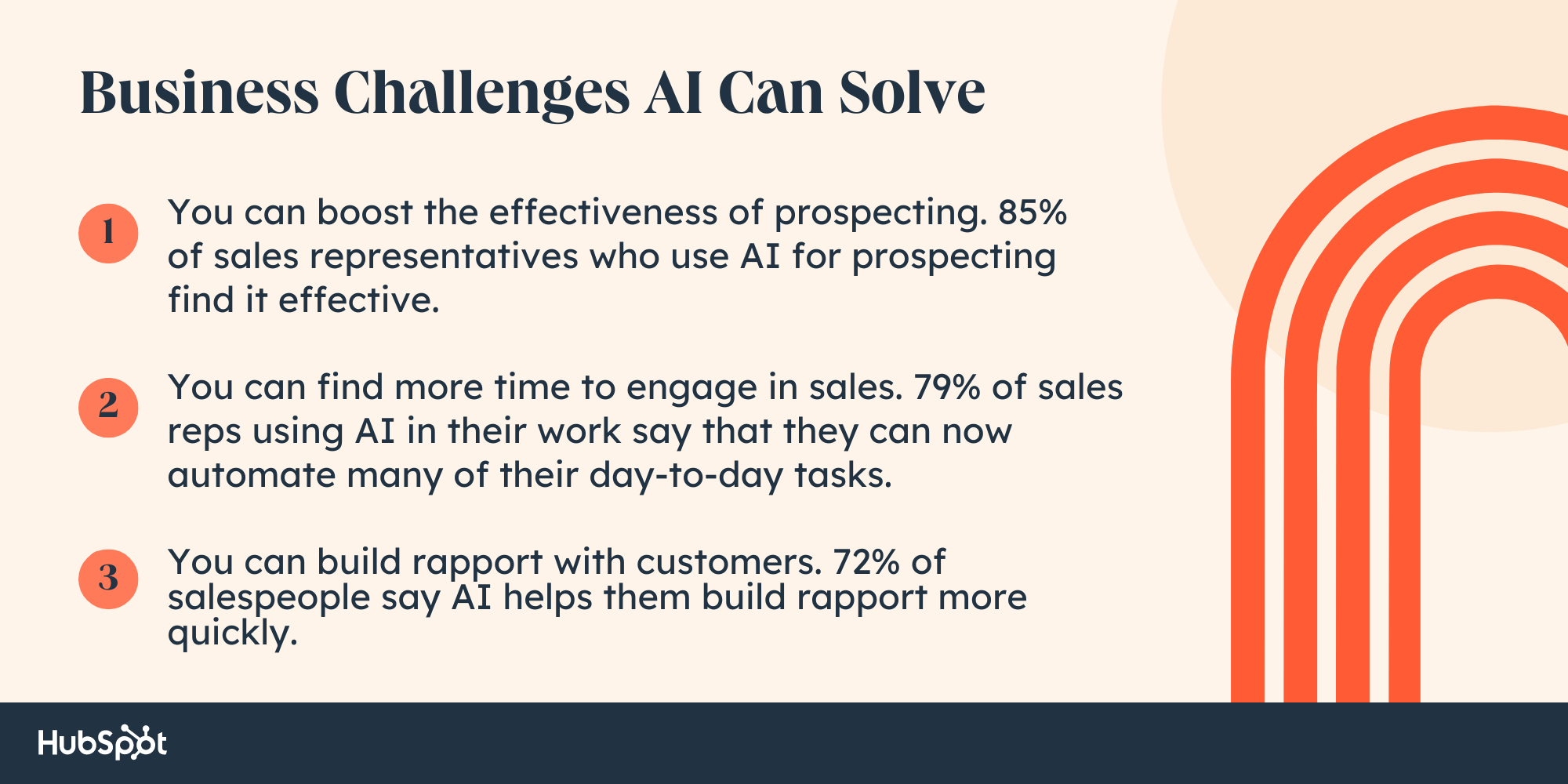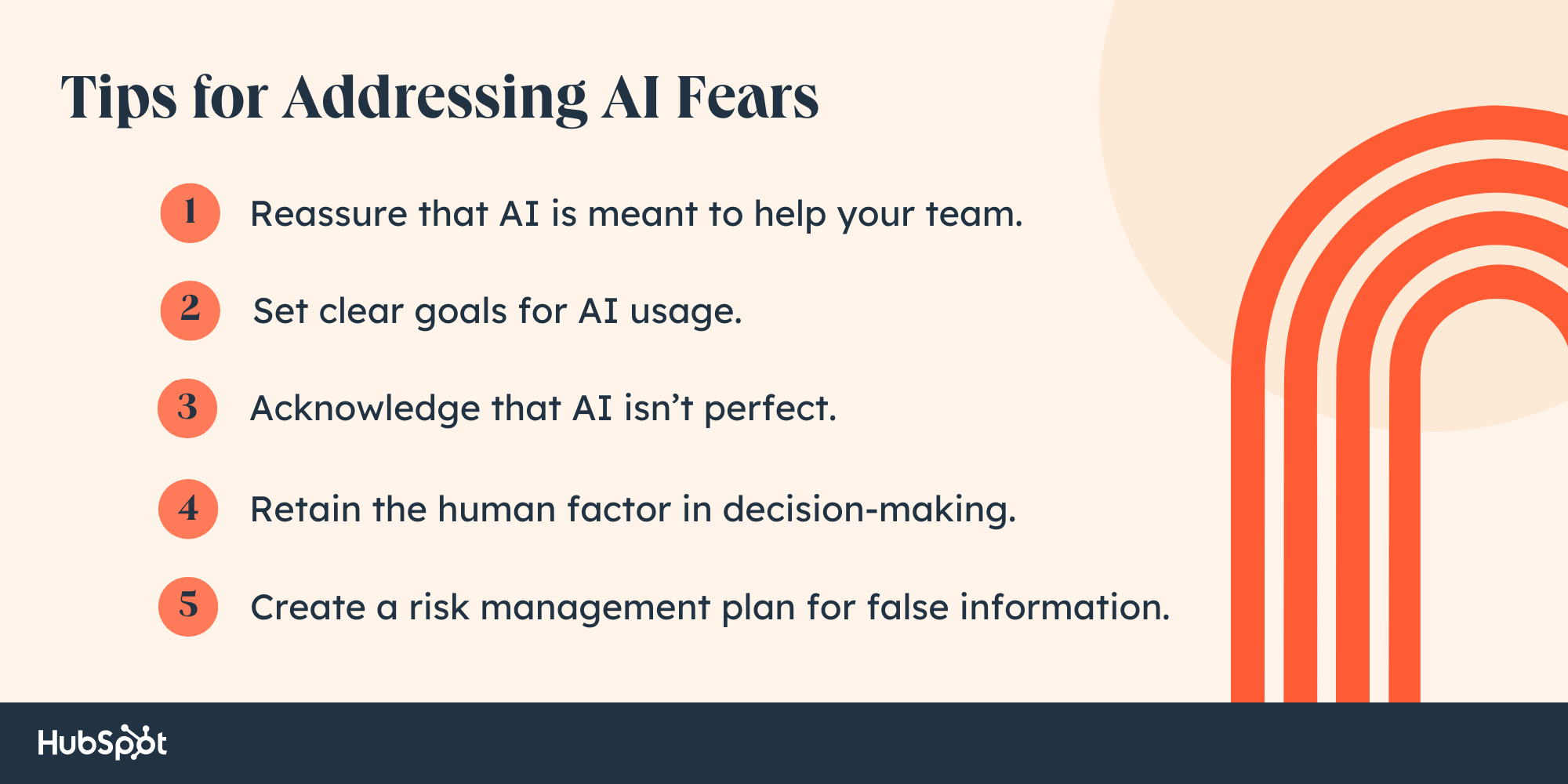It’s hard to argue with the fact that artificial intelligence has become an important element of our reality, affecting both our private and professional lives. Some of its most powerful capabilities are visible in business. In fact, it’s practically impossible to find a department that wasn’t affected by AI, with sales being no exception.

According to HubSpot’s 2023 State of AI survey, 24% of sales professionals use AI in their daily work. That said, there’s still plenty of uncertainty around what it’s capable of and, perhaps more importantly, what it should be authorized to do.
Below, we cover the main challenges AI can solve for sales professionals and how to integrate these new tools into your business.
Table of Contents
The Top Business Challenges AI Can Solve
AI is probably the most widely discussed topic these days. The list of challenges that AI can solve is growing at lightspeed. Let’s take a look at how it can help your sales team.

Boosting the Effectiveness of Prospecting
Prospecting is the holy grail of sales. That said, it's also one of the most challenging steps in the sales process, which over 50% of salespeople admit to struggling with. It can be complex (get your targeting criteria wrong, and your success rate will plummet) and very time-consuming.
Luckily, prospecting is one of the tasks that can be successfully automated with AI. According to HubSpot’s State of AI survey, 85% of sales representatives who use AI for prospecting find it effective.
They use it to:
- Create content for their outreach emails.
- Conduct research on their prospects.
- Analyze data and create reports.
- Repurpose outreach messages and tailor them to different target audiences.
Finding Time to Engage in Sales
While it might seem paradoxical, sales reps spend only a third of their workweek actively selling. What do they dedicate the rest of their time to? Mostly, strategic and administrative tasks like:
- Participating in internal meetings.
- Drafting up sales reports.
- Working on sales collateral like pricing, proposals, and outreach messages.
- Traveling and preparing expense reports.
Here’s where AI comes to the rescue. According to our survey, 79% of sales reps using AI in their work say that they can now automate many of their day-to-day tasks. As a result, they can spend more time selling.
Building Rapport With Customers
It’s safe to say that successful sales, among other things, come from relationship building. Often customers choose one product over another simply because they like the person they bought it from.
Building rapport with customers takes time and effort. It doesn’t happen overnight. And when it comes to long-lasting relationships, trust plays a vital role — it’s a basis for customer loyalty.
Can AI come in handy? It surely can — 72% of salespeople say AI helps them build rapport more quickly. Here is how:
- By automating the first contact with a lead.
- By qualifying leads more quickly and effectively, allowing salespeople to focus on those that have the highest chance of converting into a customer.
- By automating follow-ups using content tailored to the lead’s needs.
- By analyzing results of outreach campaigns and pausing those that don’t work.
Tips for Addressing AI Fears
While the impact of AI on productivity is already well-documented, many sales teams still treat it as a threat. If any of these concerns come up at your business, here’s how you can address them.

1. Reassure your sales team that AI is meant to help them.
Goldman Sachs made headlines after publishing a report which estimates that AI could take away as many as 300 million jobs. It’s hardly surprising that your sales team might grow anxious about their future.
It’s up to sales managers and directors to reassure staff that the human factor is irreplaceable in sales. Put out a statement where you acknowledge the role of sales reps. Mention that AI is here to augment their work, not to replace them.
According to Ilona Hansen, senior director analyst at Gartner, currently, 40% of administrative sales tasks can be automated. This number can increase to 47% if AI’s NLP abilities improve.
She says, "AI works best when used to support B2B sales reps in their daily sales tasks, such as recommending which lead should be contacted first, or providing insights about a sales lead or customer.”
In short, sales reps should treat AI as their personal assistants rather than competition.
2. Set clear goals for AI usage.
According to our State of AI report, 76% of professionals say employees can use automation at work but must avoid becoming overly reliant on AI. This calls for creating AI guidelines — what it can and cannot be used for.
Encourage your team to use AI as an assistant for tedious work. Writing unique email copy, running preliminary market research, or updating CRM profiles, among others. Make sure that they use the time freed up in their calendar productively.
This means engaging in tasks that require the human touch — participating in meetings and calls, handling customer objections, and appealing to emotions.
When it comes to the “no-go’s,” we recommend setting the tone for the types of information employees can disclose to AI. This will help you avoid potential data breaches and concerns from clients. For example, you can prohibit entering any internal sales or customer data into open-source tools like ChatGPT.
3. Acknowledge that AI isn’t perfect.
Worrying about the objectivity of automatically-generated data is justifiable. This is especially true if you’re part of a customer-facing team. Some factors like emotions, sentiment, and circumstances can’t be quantified.
Since AI is meant to serve humans, your team should have the green light to disagree with its results. For instance, if your employees use an AI content assistant to generate an email response but feel that it’s too informal, they should be able to edit it. The same goes for correcting information derived from internal software, like your prospect’s contact information.
What’s more, educate your employees on AI bias and encourage them to cross-reference AI responses with their own experiences and any other available sources. The best part is you can ask your team to note any concerns and use their findings to refine the system over time.
4. Retain the human factor in decision-making.
The most advanced AI system can analyze huge amounts of data and make accurate predictions. Its volume often goes beyond the capacity of the human brain. This is both impressive and scary. How so?
While AI can perform complex analyses and produce advanced reports, it cannot explain the “why” behind the results. This situation is often called the “black box” of AI, i.e., no visibility into a system’s decisions.
As you can imagine, this can be problematic for many industries, especially the highly regulated ones like healthcare or banking. Deciding on a patient’s diagnosis or treatment based on recommendations performed by an algorithm without understanding the logic behind it could prove catastrophic.
For this reason, it’s necessary that people don’t blindly follow AI recommendations. The final call should always belong to an expert. People must retain control over processes and decisions, even if the AI’s capabilities expand and it plays a more prominent role in business.
5. Create a risk management plan for AI generating false information.
As mentioned above, you can’t rule out the risk of AI producing wrong or incomplete information. If a sales rep bases their decisions on data that turns out to be wrong, they’re looking at two potential outcomes. The first is reputation damage and loss of credibility in the eyes of customers and/or team members.
The second risk is putting the organization at risk of financial loss. This has happened to Google, whose AI chatbot Bard shared false information in a video advertisement, costing the tech giant $100 billion in market value.
Inspire yourself with Google’s contingency plan to avoid following in their footsteps. The company decided to increase human control over AI by launching the Trusted Tester program. On top of information evaluators at the company, they’ll also ask external users to check Bard’s accuracy and see if they can trace it back to a reputable source.
Use AI to your advantage in sales.
Despite the trials and tribulations we’ve witnessed over the last few years (and even months), AI shouldn’t be seen as an enemy. The sooner we acknowledge its benefits in sales and use it to assist our work, the sooner it will bring tangible results for the business. Turn to it to automate prospecting, build rapport with clients, and dedicate more time to work that calls for human involvement.
As AI is still a topic that generates a lot of emotions, both good and bad, it’s your role as a sales leader to address fears and provide guidance on its acceptable use.
![Download Now: 2024 Sales Trends Report [New Data]](https://no-cache.hubspot.com/cta/default/53/9cdc68ed-d735-4161-8fea-0de2bab95cef.png)




![Will AI Steal Your Sales Job? We Asked HubSpot Experts [+ Research]](https://blog.hubspot.com/hubfs/AI%20steal%20jobs%20FI.png)

![The Benefits of AI Cold Calling [+Tips and Best Practices]](https://blog.hubspot.com/hubfs/ai-cold-calling.webp)
![How to Understand Your Prospects Better With AI [Expert Insights]](https://blog.hubspot.com/hubfs/AI%20Understanding%20Prospects.png)


